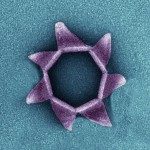Lien vers Pubmed [PMID] – 19845628
Ann. N. Y. Acad. Sci. 2009 Oct;1178:65-77
Our conceptions on the origin, nature, and role of viruses have been shaken recently by several independent lines of research. There are many reasons to believe now that viruses are more ancient than modern cells and have always been more abundant and diverse than their cellular targets. Viruses can be defined as capsid-encoding organisms that transform their “host” cell into a viral factory. If capsid-encoding organisms (viruses) and ribosome-encoding organisms (cells) are the major types of living entities on our planet, it seems logical to conclude that their conflict has been a major engine of biological evolution (in the framework of natural selection). In particular, many novelties first selected in the viral world might have been transferred to cells as a consequence of the continuous flow of viral genes into cellular genomes. We discuss recent observations and hypotheses suggesting that viruses have played a major role at different stages of biological evolution, such as the RNA to DNA transition, the origin of the eukaryotic nucleus, or, alternatively, the origin of unique features in multicellular macrobes.
